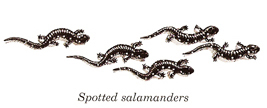|
An Amphibian Bill of Rights
I took my daughter up to the Robinsons' Swamp to see if the salamanders that normally breed there had arrived. We could hear the spring peepers calling long before we got there, and once we got onto Robinson Road it took us a long time to get up to the swamp because every ten yards I’d see another one of those white twigs in the headlights and have to stop the car. I knew from experience that these “white twigs” were in fact salamanders, and so I had to pull over, stop the car, put on the blinkers, get out, and risk my life issuing the poor things from one side of the road to the next before some other driver winged by and squashed them. And then fifty yards farther along, there would be another one. And in between, I’d see those little white pebbles in the headlights that turned out to be spring peepers, or wood frogs, and have to stop again and wait while they made up their minds to hop on. And this was only the beginning. We had had a few nights like this earlier, three to be exact, but this was what those who follow this sort of thing term the “big night”. The storm was engulfing the entire region, and anywhere outside of a major city, and in some cases perhaps even within a major city, there would be frogs and salamanders in the road. And this was, as I say, only the beginning. To my knowledge, no one has ever been able to calculate just how many frogs and salamanders emerge from their winter hibernation in a given region on a given night like this and move through woodlands and fields, meadows, people’s backyards, and even parking lots --- crossing, wherever necessary, the back roads of suburbia and what used to be termed the countryside (whatever that means in this age of decentralized settlements when every other new house seems to back onto a ten-thousand-year-old wetland where frogs and salamanders mate and lay their eggs). Furthermore, no one to my knowledge has ever been able to determine just how many of those migratory amphibians are killed on a rainy night in spring when they are on the move. I do know this. I know that I have been out on certain roads, in certain sections of the countryside on certain warm, rainy nights in late spring when the green frogs are on the move; and I have stepped out of the car and I have been able to smell—not necessarily see, mind you—but, actually, smell---the odor of dead frogs. It’s a distinct scent, not even a bad smell, more of a wet, muddy, froggy, sort of smell. I know of a woman who annually stands by a road near her house with a flashlight and flags down cars when “her” frogs are moving from their breeding pools to a nearby lake. One night she counted 278 frogs on the move. Even with her vigilance, 47 of them died under the wheels of impatient drivers that night. Another friend has stopped walking the road in front of her house on mornings following heavy rains. The hundreds of "smushed frogs," as she phrases it, are too much to bear. For years I used to think that when I get old and crazy, I will become one of those persistent devils that legislators see in the halls of the State House, a disheveled, harmless old fellow with a bizarre mission and a leather briefcase spilling over with documents containing frog and salamander mortality statistics as well as signed petitions proposing a bill that would do something, finally, to halt the slaughter of frogs and salamanders on roads. Such a bill I am informed, would be laughed out of the halls of justice. But who cares? I’m serious about it. There are too many roads, and too few frogs, and I don’t care what anyone says about “progress” and the need for access, and traffic volumes, and curb cuts, and the fact that people must have homes, and that roads have to be built to get to said homes, and that in order to do that local wetlands where frogs and salamanders breed have to be filled. If people want to get home on rainy nights, let them walk home from train stations on footpaths. But, that too, at least from the point of view of a human being, would seem absurd. Frogs might not see it that way, though. JHM
|
